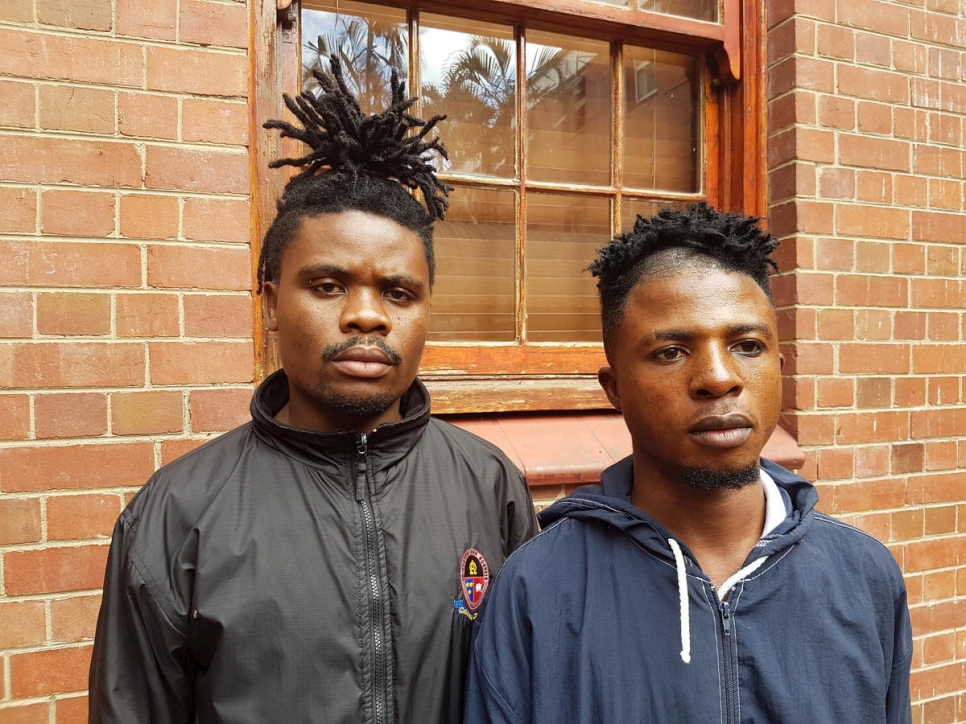Refugees affected by xenophobic attacks in South Africa in need of urgent support
Left homeless and without any support, 53 refugees who faced recent xenophobic attacks in a Durban township are struggling to rebuild.
Esperance Zawadi (centre), her husband (in red) and a group of Congolese refugees were left homeless and penniless after their property was vandalized in xenophobic attacks in Durban, South Africa.
© UNHCR/Pumla Rulashe
When 26-year-old Esperance Zawadi opened the door to loud, insistent knocking in the early morning on the last day of March, she had no idea it was the start of a sequence of events that would change her life and that of the refugee community in Umlazi Township’s Philani section in Durban.
A group of over 20 men and women ordered her husband to the door.
“I immediately felt faint with fear,” she recalls. “The attitude and anger they demonstrated meant big trouble!”
“What do they want from my husband? What has he done? ”
A series of questions ran frantically through the Congolese refugee’s mind: what do they want from my husband? What has he done? What could have happened to bring all these people to my door so early in the morning?
The men jostled for positions to take a good look at Zawadi’s husband as he came to the door. Zawadi explains that they were looking for a short, dark-skinned, dreadlocked foreign national who had allegedly murdered a member of their community the previous night.
“Their leader announced that it wasn’t my husband but as foreigners, we would know who they were looking for,” she says, adding that she and her husband were then forced out of the house.
Their Congolese neighbor, Matabishi Kasese, 29, was also confronted with the same accusations and then bundled into the boot of a car with his brother before being driven off to an unknown location.
Zawadi managed to escape and ran towards a nearby taxi rank.
“I didn’t want to leave my husband but he forced me to leave for the safety of the city,” she says adding that he promised to find her if he survived.
Zawadi’s husband, Kasese and his brother say they were subjected to beatings punctuated with orders to reveal the whereabouts of the man the attackers were after.
A breakaway group of the irate mob would continue on their search and seizure of refugees and asylum seekers in Philani.
They rushed towards Robert ‘Gift’ Mafikiri’s barbershop. The Congolese refugee took one look at the approaching mob and ran for his life. Short, slim, dark-skinned and dreadlocked, he fit the profile of the wanted man they were looking for. Eventually cornered and captured, he was beaten unconscious and dumped in a remote location on the outskirts of Umlazi.
News of the attack spread fast forcing 53 Congolese and Burundian refugees, including eight school going children, to flee to the Refugee Social Services (RSS), which works with UNHCR, the UN Refugee Agency in Durban. Both organizations carried out the verification of the displaced refugees, drawing in the Department of Home Affairs (DHA) to assist with the re-issuance of permits lost as they fled.

Matabishi Kasese (left) and Robert Mafikiri (right) were affected by the xenophobic attacks in Umlazi township in Durban, South Africa. They are afraid of returning to the township. © UNHCR/Pumla Rulashe
“Refugees and asylum seekers have often been targeted in South Africa amid an economic downturn as communities blame their struggles on foreigners,” says Madalena Hogg, UNHCR’s Senior Operations Manager in Durban. “Their protection rests primarily with the South African government.”
She adds that part of their protection includes the issuance of Section 22 and 24 asylum seeker and refugee permits respectively, both of which grant the holders of these documents the legal right to work and study, as well as the protection of their fundamental human rights which are enshrined in the South African Constitution.
UNHCR and several other humanitarian organisations are using community based meetings with key government departments, including DHA, the Department of Arts and Culture (DAC), Community Safety, the South African Police Services (SAPS) and the KwaZulu Natal Council of Churches to re-engage on the importance of a sustained public education campaign on the plight and rights of refugees.
“Strong commitment and a concerted effort to address the problems giving rise to xenophobic violence is required from all stakeholders in general, particularly the Government,” adds UNHCR’s Hogg.
To help the survivors of the attacks get back on their feet, UNHCR is sourcing financial support for the implementation of a reintegration package which includes a contribution towards payment of rent for a limited period. It also includes the provision of income generating equipment such as scissors, hair and shaving clippers which were lost during flight. Families are receiving between US $240 and US $520 depending on the number of children.
“Strong commitment and a concerted effort to address the problems giving rise to xenophobic violence is required ...particularly [from] the Government.”
UNHCR has spent close to US $3,000 on the refugees’ immediate needs with the reintegration package “most likely to run into the thousands,” says Hogg.
Since the attacks, refugees have been accommodated at Haven of Hope, a shelter in Durban’s central business district. They are adamant that they will not return to Umlazi township and many are looking for affordable accommodation elsewhere.
“We are too traumatized,” says Mafikiri who adds that people he has met from Philani after the attacks are shocked to see him alive.
“Others jeer at us from taxis and buses, telling us that if we return, they’ll be waiting for us,” he laments. “I can’t in all honesty be expected to return there after I stared death in the face.”
